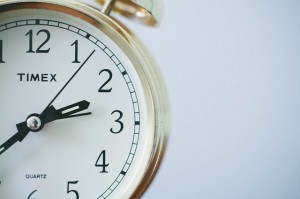 Time has indeed become a very precious commodity. We are all hungry for tools and tactics to help us streamline every moment of our lives, from finding the quickest route to the gym to the most time-efficient workout when we get there. We’ve even been known to blame our “busy lifestyle” for making it difficult to stick to our diets. The ability to get the most out of the ‘right here, right now’ has been largely facilitated by the recent rise in mobile phone GPS technology that marries productivity with geographic relevancy.
Time has indeed become a very precious commodity. We are all hungry for tools and tactics to help us streamline every moment of our lives, from finding the quickest route to the gym to the most time-efficient workout when we get there. We’ve even been known to blame our “busy lifestyle” for making it difficult to stick to our diets. The ability to get the most out of the ‘right here, right now’ has been largely facilitated by the recent rise in mobile phone GPS technology that marries productivity with geographic relevancy.
For instance, Sitegeist is a free mobile app that helps users learn more about their surroundings in seconds. The app, developed by the Sunlight Foundation, takes public information about the people, housing, history, environment, and surroundings of any US location and presents it in easy-to-view infographics. Data about everything from age distribution, political contributions, media home values, and record temperatures are available. The app also incorporates publicly available data from sources like the US Census Bureau, influenceexplorer.com, the Dark Sky weather API and even Yelp and Foursquare, all at the swipe of a finger.
As such, consumers are seeking apps that point out hidden location related attractions like Field Trip!, apps that provide art education on a daily basis such as Your Daily Art, and even apps that allow retailers to target app users as they approach their stores using augmented reality coupons.
Another facilitator of this app hack lifestyle is the fact that consumers are becoming more and more accustomed to finding information about what they’re doing or interested in on their phones. According to Mintel’s Living Online US July 2012 report, 49% of people say that they keep their smartphone with them at all times so that they can search for information whenever they need it.
Making the Most of ‘Right Here, Right Now’
While digital location based connectivity is allowing consumers to indulge their appetites for instant gratification, it is benefitting companies as well. Businesses across industries will do well to join in the community of connectivity by.
- Making sure listings and store information are accurate.
- Ensure that you have an active and updated Google/Yelp account.
- Provide quick and genuine feedback to customer inquiries.
This is especially true for local small businesses that don’t have the same level of brand awareness that the bigger fish have.
Taking a Break isn’t always bad
Alternatively, businesses may also benefit from offering consumers a bit of a respite from constant connectivity during a shopping trip or visit. For example Brazilian Polar Beer blocks helps consumers disconnect to reconnect in Brazil by developing a beer cooler that blocks all cell and mobile internet signals within a 1.5 meter radius. The goal is to encourage good ol’ conversation.
Unicef also incentivizes consumers to take a step away from their phones by giving clean water donations to children in need around the world for every minute a phone remains untouched by participants. The trend of constant connectivity is beneficial in many ways it also has the ability to hinder real world conversation and interaction. Customers can benefit from and appreciate a break.
Personal Betterment
The rise in personal data collection and analysis allows consumers to make smarter and faster decisions—often without having to consult an outside authority.
Life hacking includes a number of broad categories—everything from health maintenance to workplace productivity and financial management. At it’s core, it comes down to simple tricks to maximize time and manage information, with the ultimate aim of bettering themselves. All of this gives consumers a sense of control and command over the many facets of their busy lives. So go ahead, and Life Hack away my friend!




